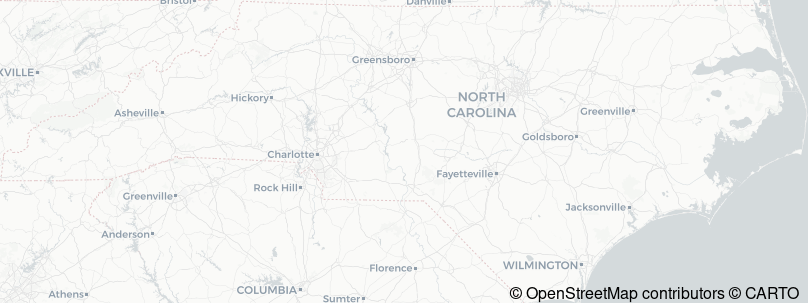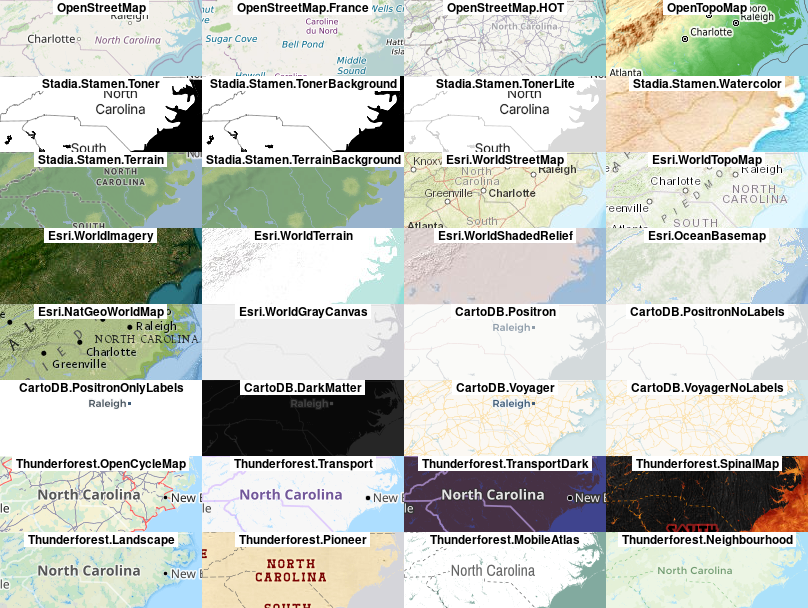Download and Display Map Tiles.
maptiles 
To create maps from tiles, maptiles downloads, composes and displays tiles from a large number of providers (e.g. OpenStreetMap, Stadia, Esri, CARTO, or Thunderforest).
Installation
You can install the released version of maptiles from CRAN with:
install.packages("maptiles")
You can install the development version of maptiles from GitHub with:
# install.packages("remotes")
remotes::install_github("riatelab/maptiles")
Demo
This is a basic example which shows you how to dowload and display OpenStreetMap tiles over North Carolina:
library(sf)
#> Linking to GEOS 3.13.1, GDAL 3.10.3, PROJ 9.6.0; sf_use_s2() is TRUE
library(maptiles)
# import North Carolina counties
nc_raw <- st_read(system.file("shape/nc.shp", package = "sf"), quiet = TRUE)
# Project to EPSG:3857
nc <- st_transform(nc_raw, "EPSG:3857")
# dowload tiles and compose raster (SpatRaster)
nc_osm <- get_tiles(nc, crop = TRUE)
# display map
plot_tiles(nc_osm)
# add Norh Carolina counties
plot(st_geometry(nc), col = NA, add = TRUE)
# add credit
mtext(text = get_credit("OpenStreetMap"), side = 1, line = -1, adj = .99)

maptiles gives access to a lot of tiles servers, but it is possible to add others. The following example demonstrates the setting of a map tiles server and how to cache the original tiles for future use:
# define the tile server parameters
osmpos <- create_provider(
name = "CARTO.POSITRON",
url = "https://{s}.basemaps.cartocdn.com/light_all/{z}/{x}/{y}{r}.png",
sub = c("a", "b", "c", "d"),
citation = "© OpenStreetMap contributors © CARTO "
)
# dowload tiles and compose raster (SpatRaster)
nc_osmpos <- get_tiles(
x = nc, provider = osmpos, crop = TRUE,
cachedir = tempdir(), verbose = TRUE, retina = TRUE
)
#> Zoom: 7
#> Source(s): © OpenStreetMap contributors © CARTO
#> Cache directory: /tmp/RtmpShod4e/CARTO.POSITRON
#> 8 tiles
#> The resulting raster uses high resolution tiles.
# display map
plot_tiles(nc_osmpos)
# display credits
mtext(text = get_credit(osmpos), side = 1, line = -1, adj = .99)

The following figure shows mini maps for most of the tiles providers available:

Projection
Original tiles use a projection known as “Web Mercator”, “WGS84 / Pseudo Mercator”, “Google Mercator”, “EPSG:3857” or “EPSG:900913”. In most cases get_tiles() uses the projection of its x argument to reproject the tiles. If you wish to avoid any deformation induced by the reprojection process, use “EPSG:3857” for x projection.
Attribution of map tiles
All maps available through maptiles are offered freely by various providers. The only counterpart from the user is to properly display an attribution text on the maps. get_credit() displays a short attribution text to add on each map using the downloaded tiles.
Alternatives
There are many alternative packages that pursue the same objective as maptiles. Some focus on a specific map tiles provider (e.g. Mapbox, Google, OpenStreetMap) or on a specific graphics device (ggplot2). The goal of maptiles is to be flexible enough to allow the use of different providers and to have a minimal number of robust and modern dependencies. However, depending on the use case, one of following packages may better suit your needs:
ceramicggmap(ggplot2focused)ggspatial(ggplot2focused, based onrosm)mapboxapi(mapbox)mapsapi(google, based onRgoogleMaps)OpenStreetMap(requires Java)RgoogleMaps(google)rosm- …
Note
Not to be confused with tilemaps, that “implements an algorithm for generating maps, known as tile maps, in which each region is represented by a single tile of the same shape and size.”